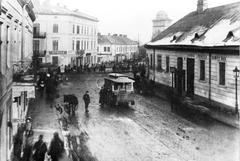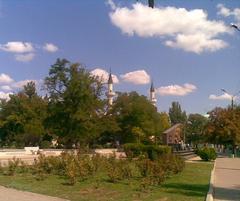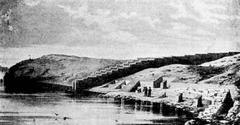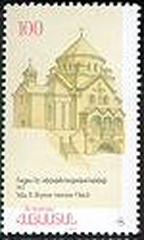Eupatorian Kenassas: Visiting Hours, Tickets, and Guide to Yevpatoria’s Historical Sites
Date: 04/07/2025
Introduction
Nestled in the heart of Yevpatoria (historically Kezlev) on the Crimean Peninsula, the Eupatorian Kenassas stand as a remarkable testament to the rich cultural and religious heritage of the Crimean Karaites. This distinctive ethnoreligious group, with roots in Karaite Judaism and a Turkic linguistic heritage, has shaped the region’s history for centuries. The Kenassas complex—comprising two synagogues and auxiliary buildings—serves as both a spiritual sanctuary and a symbol of cultural resilience, reflecting architectural influences from Crimean, Ottoman, and European traditions.
This comprehensive guide provides detailed information for visitors, including the history and significance of the Kenassas, practical details about visiting hours and tickets, guidance on etiquette, accessibility, and travel safety, as well as an overview of Yevpatoria’s other historical attractions. Whether you are a history enthusiast, cultural explorer, or planning your first trip to Crimea, this article will help you navigate one of the peninsula’s most treasured sites.
For up-to-date visitor information and further resources, see Trek Zone, Discover Ukraine, and the Official Crimea Tourism Portal.
Historical Overview
Origins and Development
The Eupatorian Kenassas are among the most significant monuments of the Crimean Karaites—a community that emerged as a distinct movement within Judaism in the 8th century CE, distinguished by a strict adherence to the Hebrew Bible and a rejection of rabbinic tradition (bloggoodwordebooks). The Karaite presence in Crimea dates back to the medieval period, with Yevpatoria becoming a major center of Karaite life and scholarship.
The Kenassas complex was constructed in the 19th century during a period of prosperity, serving as the communal heart for worship, education, and cultural preservation. Yevpatoria’s reputation for religious diversity—earning it the nickname “Small Jerusalem”—is reflected in its many places of worship, including mosques, churches, and synagogues (discover-ukraine).
Architectural and Artistic Significance
The Kenassas complex consists of two principal synagogues: the Great Kenassa (for festivals and large gatherings) and the Small Kenassa (for daily prayer), along with a courtyard, ritual bath (mikveh), and community buildings. The architecture features intricate stucco, decorative tiles, and inscriptions in Hebrew and Karaim. Inside, visitors will find ornate wooden ceilings, stained glass windows, and a unique arrangement of the bimah and ark, all testifying to the synthesis of local and imported artistic influences (discover-ukraine).
The Karaite Community and Multicultural Heritage
The Karaites have maintained a distinct religious and cultural identity in Crimea, marked by their language, traditions, and unique approach to Judaism. By the 15th century, significant Karaite communities had settled in Yevpatoria and other towns, often enjoying protection under local rulers (thebrainchamber). Despite historical challenges, including Russian annexation and demographic changes, the community preserved its institutions and traditions.
Yevpatoria’s multicultural fabric is evident in the coexistence of diverse religious sites. The Kenassas, alongside the Juma-Jami Mosque and various churches, highlight centuries of religious interaction and tolerance, embodied in the city’s “Small Jerusalem” walking route (discover-ukraine).
Preservation Challenges
The annexation of Crimea by Russia in 2014 and the ongoing conflict have posed challenges to the preservation and accessibility of the Kenassas (euideas.eui.eu). International organizations, including UNESCO, have called for monitoring and protection of the site’s heritage, while local and diaspora Karaite groups advocate for restoration and preservation (arcrimea.org).
Practical Visitor Information
Location and Access
- Address: 68 Karaimskaya Street, Yevpatoria, Crimea
- The Kenassas are centrally situated, within walking distance of other landmarks such as the Juma-Jami Mosque and Armenian Church.
Visiting Hours
- Standard Hours: Tuesday–Sunday, 10:00 AM–5:00 PM (closed Mondays)
- Hours may vary during holidays or maintenance. Always check the official Crimea tourism portal for the latest updates.
Tickets and Admission
- Admission Fee: Approximately 200–300 rubles (2–3 USD) or equivalent in local currency
- Discounts: Available for students, children, seniors, and groups
- Purchase: Onsite or via authorized tourism websites
Guided Tours
- Offered daily in Russian, with occasional English or Ukrainian options
- Advance booking is recommended, especially during peak seasons
- Tours provide insight into the Kenassas’ history, architecture, and religious significance
Accessibility
- Main courtyard and lower prayer halls are accessible via gently sloping paths
- Upper galleries and some historic staircases may be challenging for visitors with limited mobility
- Basic restroom facilities and a gift shop are available
Visitor Etiquette
- Dress Code: Modest attire covering shoulders, arms, and knees; women may wear head coverings as a sign of respect
- Behavior: Maintain silence in prayer halls, silence mobile phones, and avoid loud conversations
- Photography: Permitted in courtyards and exteriors; prohibited inside prayer halls or during ceremonies unless authorized
Special Events
The Kenassas hosts Karaite religious services and cultural events year-round. During major holidays or festivals, certain areas may be restricted. Visitors encountering ceremonies are asked to respect privacy and community customs.
Safety, Travel Restrictions, and Political Context
Security and Health
- The Kenassas and Yevpatoria’s historical center are generally safe for tourists, but visitors should stay alert and secure personal belongings.
- Healthcare facilities in Crimea are limited; comprehensive travel insurance and necessary medications are recommended.
Travel Restrictions
- Entry to Crimea is legally complex. Entering via Russia is considered illegal under Ukrainian law and may affect future travel to Ukraine (visitukraine.today).
- Most foreign governments advise against travel to Crimea due to ongoing conflict and legal uncertainties.
- The Russian ruble is used for all transactions; mobile connectivity and some services may be limited due to sanctions.
Cultural Sensitivity
- Avoid political discussions and photographing government or military sites
- Respect local customs and religious sensitivities
Nearby Attractions
- Juma-Jami Mosque: A 16th-century Ottoman mosque, a masterpiece of Islamic architecture
- Armenian Church: Another testament to Yevpatoria’s multicultural past
- City Embankment: Lively waterfront with cafés and shops
- “Little Jerusalem” Walking Route: Explore synagogues, mosques, and churches along a scenic path
Frequently Asked Questions (FAQ)
What are the opening hours of the Eupatorian Kenassas?
Tuesday–Sunday, 10:00 AM–5:00 PM; closed on Mondays. Hours may vary during holidays.
How can I buy tickets?
Tickets are available onsite or through authorized tourism websites. Discounts for students, children, and seniors.
Are guided tours available?
Yes, in Russian and, occasionally, in English or Ukrainian. Book in advance for best availability.
Is photography allowed?
Permitted in courtyards and exterior areas. Interior photography requires permission.
Is the site accessible for visitors with mobility needs?
Main areas are accessible; some upper galleries may not be.
What should I wear?
Modest clothing covering shoulders, arms, and knees; women may cover their heads.
Final Tips and Summary
A visit to the Eupatorian Kenassas offers a unique window into the heritage of the Crimean Karaites and the multicultural history of Yevpatoria. To ensure a respectful and enriching experience, plan your visit around official opening hours, purchase tickets in advance if possible, and observe site etiquette. Always check the latest travel advisories and legal entry requirements due to the region’s complex political status.
For up-to-date information, guided audio tours, and news on festivals or cultural events, download the Audiala app and follow our channels. Your support aids the preservation of this extraordinary landmark and helps promote cultural understanding.
Visuals and Interactive Media
- Include high-quality images of the Kenassas exterior and interior (with alt tags such as “Eupatorian Kenassas facade in Yevpatoria” and “Interior prayer hall of Eupatorian Kenassas”).
- Embed a map showing the Kenassas’ location in Yevpatoria.
- Link to virtual tours if available.
Internal Links
Authoritative Sources and Further Reading
- The Karaites: Unraveling an Ancient Jewish Sect
- Discover Ukraine – Yevpatoria Guide
- Trek Zone – Yevpatoria: Places to Visit
- CruiseMapper – Yevpatoria Port
- Official Crimea Tourism Portal
- EU Ideas – Protecting Cultural Heritage During the War in Ukraine
- ArCrimea – Ukrainian Cultural Heritage in Crimea
- Visit Ukraine Today – Is It Possible to Visit Crimea Now?



